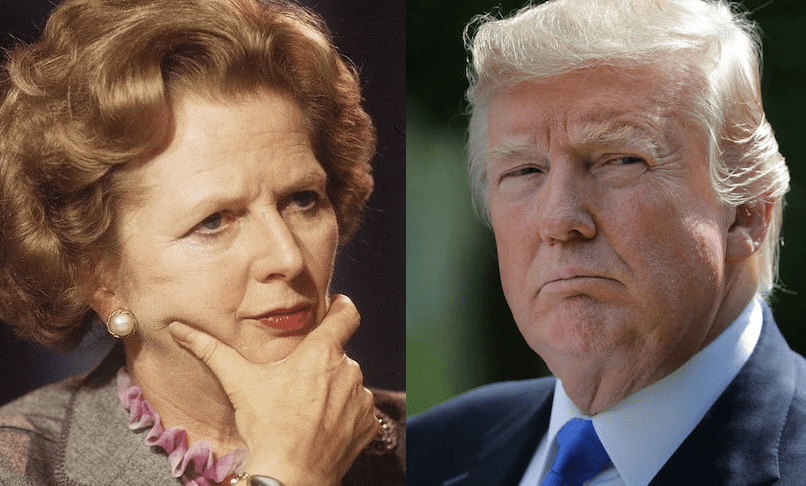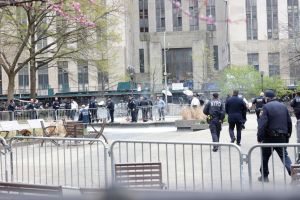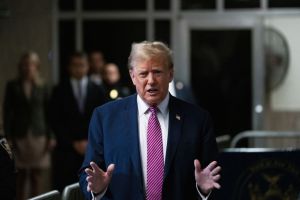‘Has that orange baboon gone yet?’ asked a senior professor in the teacher’s room at my university yesterday.
The remark went down well, despite the unfashionable remark about someone’s skin color and the dubious zoomorphic comparison.
As did an earlier comment from another colleague joking about how he’d like to replace Trump’s corona medication with something more potent (i.e. he wishes he were dead).
I’ve had more than four years of this sort of ‘banter’ at the university I work at, which pretty much sums up the consensus view among academics of the outgoing president: Trump is a disgrace to humanity, a complete aberration, and the sooner he departs the White House — and this earth for that matter — the better.
The highlight of four years of abuse towards Trump include an English professor who celebrated the Japanese festival of Setsubun (where beans are thrown at imaginary devils) by pinning a picture of Trump on the wall and having the class aim their ammunition at it instead. He boasted about this in a staff meeting.
Then there was the Canadian colleague, terrified that his accent might mean he was mistaken for an American, who took to wearing a maple leaf lapel badge every single day. And there was the American lecturer who began preemptively apologizing on behalf of his nation to everyone he was introduced to. Another American professor told me she had severed all ties with relatives back home whom she’d discovered were ‘Trump sympathizers’.
This bottomless contempt, expressed without caveat, and in the apparent certainty that no sane person could possibly disagree, reminded me of the venom directed at Margaret Thatcher by academics during her time as British prime minister. And the atmosphere of relief and celebration after the US election result is reminiscent of the period when Mrs Thatcher was forced from office, when I was an undergraduate at the University of St Andrews in Scotland.
I recall that one of my history lecturers, now a prominent Guardian contributor, could barely conceal his delight. He opened our first post-Maggie class by writing the word ‘Thatcher’ on the board and then, with a gleeful, triumphant flourish, crossing it out.
The academics themselves would claim, and no doubt believe, that their animus derives from their superior humanity. But I have an alternative theory, and it’s a simple one: insecurity.
Trump, the great deal-maker (in his own mind at least) measured success in terms of bottom lines and negotiating outcomes, a philosophy inimical to most academics.
His very presence in the White House was living proof of how far you can go without paper qualifications, or even reading books. Suspicious of the academy and its leftward lurch, he justified withholding funding from institutions that practiced affirmative action and had diversity programs.
Similarly, Thatcher, despite her own academic success, was at heart the grocer’s daughter who weighed the produce in her father’s shops and took fair payment in pounds, shillings and pence.
Thatcher took this thinking with her into No. 10. Building on her relatively unproductive spell as education minister she introduced measures to gauge teaching and research ‘quality’ — replacing the university grants committee with a funding council shorn of most of its academics — and removed the security of tenure for many. As with the grocers, there was to be nothing on tick.
Trump had the disturbing habit of asking uncomfortable questions about the worth of institutions with no tangible end product: ‘What’s the point of Nato?’ he has effectively asked. Thatcher might have wondered the same about the NUT.
Basically, Thatcher and Trump lacked the automatic respect many academics feel is their due. They gave the impression that they could see right through us — an uncomfortable feeling.
But if the sentiments of the majority of educators of 2020 and 1990 are similar, what has changed is the level of censoriousness, and the fear among the few dissenters of speaking out against the consensus. Pro-Thatcher academics were perhaps not too popular in the staff room, but didn’t live in fear of losing their jobs. I’m not sure that is true about Trump.
[special_offer]
Now and again I gently take on my Trump-hating colleagues. I point out that, however disagreeable his personality, being the first president in 40 years to not engage or escalate a war means an awful lot of people have avoided being killed. And an improved American economy meant better living conditions for those at the bottom of the heap. And then there was Trump’s potentially huge breakthrough in the Middle East peace process.
Is it not worth at least thinking about these things before we start declaring the Trump era an unmitigated disaster and start popping the champagne corks? ‘You can’t possibility defend Trump’, said a Canadian professor friend when I raised these points.
And what worried me was that I’m not entirely sure in what sense the word ‘can’t’ was being used.
This article was originally published onThe Spectator’s UK website.


















